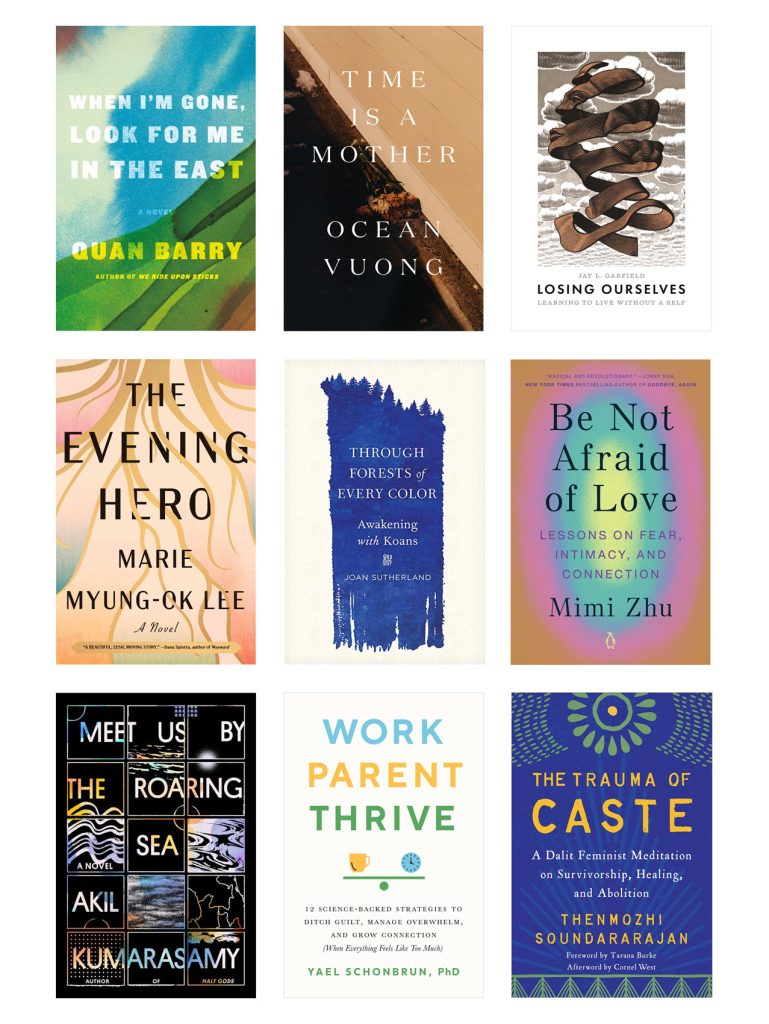In every issue of Tricycle magazine, we share a collection of new books that we’re enjoying—and an older one that we’re re-visiting—in our What We’re Reading section. Throughout the year we also interview authors, feature book passages that moved us, and write reviews both online and in print. Every year, it feels like there are more and more great reads capturing our attention, and 2022 was no exception. From an introduction to Zen’s koan tradition and a highly-anticipated poetry collection to a novel that considers AI and radical compassion, here are some of the titles we couldn’t put down.
When I’m Gone, Look for Me in the East by Quan Barry
In Quan Barry’s ambitious novel, two telepathic twins set out across the Mongolian steppe in search of the reincarnation of a Buddhist master. Along the way, the twins grapple with questions of desire, doubt, and the place of faith in a changing world. Listen to Barry talk about the book in a podcast interview with Tricycle’s editor-in-chief, James Shaheen, and meditation teacher Sharon Salzberg.
—Sarah Fleming
Time Is a Mother by Ocean Vuong
Written in the aftermath of his mother’s death from breast cancer, Ocean Vuong’s latest poetry collection offers an intimate portrait of grief, loss, and intergenerational trauma. Listen to Vuong discuss how Buddhist mourning rituals influence his work on an episode of Life As It Is.
—Sarah Fleming
Losing Ourselves: Learning to Live without a Self by Jay L. Garfield
Drawing from traditional Buddhist texts, Western philosophy, and cognitive neuroscience, scholar Jay L. Garfield explores how we can let go of our selves to reclaim our humanity. Listen to Garfield discuss the perils of the self illusion on an episode of Tricycle Talks.
—Sarah Fleming
The Evening Hero by Marie Myung-Ok Lee
In this novel about the Korean War and the dwindling American dream, author Marie Myung-Ok Lee weaves together vivid scenes of wartime and the enduring pain of displacement with satirical commentary on commercialized healthcare and capitalism. Listen to Lee speak with Tricycle’s editor-in-chief, James Shaheen, on Tricycle Talks.
—Alison Spiegel
Through Forests of Every Color: Awakening with Koans by Joan Sutherland
This collection is a charming and accessible introduction to Zen’s koan tradition from the co-founder of the Pacific Zen School and founder of The Open Source, a network of communities in the western United States. It’s a great read those who may find traditional koan collections intimidating or inaccessible.
—Phil Ryan
Be Not Afraid of Love: Lessons on Fear, Intimacy, and Connection by Mimi Zhu
In this powerful and vulnerable collection of essays, writer Mimi Zhu shares their journey of healing from intimate-partner abuse by sitting with suffering and embracing love. Read an excerpt from the book here, in which Zhu explores how rituals around loss can transform deep grief into love.
—Amanda Lim Patton
Meet Us by the Roaring Sea by Akil Kumarasamy
In Akil Kumarasamy’s debut novel, a grieving AI programmer translates a Tamil manuscript on radical compassion—and slowly becomes unhinged by the question of what it means to care for another. Read an interview with Kumarasamy here, in which she discusses the ethics of translation and how literature can help us bear witness to suffering.
—Sarah Fleming
Work, Parent, Thrive: 12 Science-Backed Strategies to Ditch Guilt, Manage Overwhelm, and Grow Connection (When Everything Feels Like Too Much) by Yael Schonbrun, PhD
Especially timely for working parents who, on the heels of lockdown, faced rampant viral infections and childcare shortages this fall, leading to a record number of workplace absences, clinical psychologist Yael Shonbrun’s new book provides practical, non-judgmental guidance for not just managing but appreciating the pressure of working and parenting. Schonbrun practices third wave psychotherapy, which draws, in large part, on Daoist and Buddhist ideas.
—Alison Spiegel
The Trauma of Caste: A Dalit Feminist Meditation on Survivorship, Healing, and Abolition by Thenmozhi Soundararajan
Thenmozhi Soundararajan’s new book is a brave powerhouse of an investigation into the ongoing ways that caste—India’s social hierarchy that has existed for 3,000 years—continues to negatively impact all aspects of life in Southeast Asia and beyond. Soundararajan, a second generation Dalit American, shares painful personal stories about learning she was a Dalit, or the pejorative “untouchable” caste. The Trauma of Caste is essential reading in the socially engaged Buddhism canon, and in addition to highlighting the ways each of us can work toward ending caste apartheid, includes an appendix on Ambedkarite Buddhist ancestors in India who can inspire our own practice.
—Wendy Biddlecombe Agsar
Thank you for subscribing to Tricycle! As a nonprofit, we depend on readers like you to keep Buddhist teachings and practices widely available.
